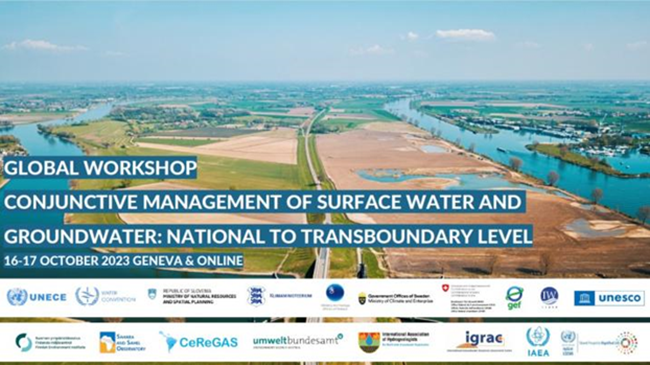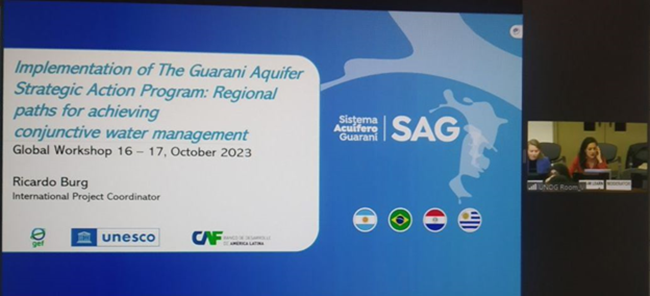GLOBAL WORKSHOP ON CONJUNCTIVE MANAGEMENT OF SURFACE WATER AND GROUNDWATER: NATIONAL TO TRANSBOUNDARY LEVEL
The Global workshop on conjunctive management of surface water and groundwater: national to transboundary level took place in Geneva on October 16-17, 2023.

The Global Workshop was organized within the framework of the Water Convention under the umbrella of UNECE and leadership of the Ministry of Climate of Estonia, the Ministry of Natural Resources and Spatial Planning of the Republic of Slovenia and in partnership with the United Nations Educational, Scientific and Cultural Organization (UNESCO), the United Nations Economic and Social Commission for Western Asia (UNESCWA), the International Atomic Energy Agency (IAEA), the Finnish Environment Institute (SYKE), the International Groundwater Resources Assessment Center (IGRAC), the Transboundary Aquifers Commission of the International Association of Hydrogeologists (IAH), the Regional Centre for Groundwater Management in Latin America and the Caribbean (CeReGAS), the Sahara and Sahel Observatory (OSS), the Environment Agency Austria (UBA), and GEF IW:LEARN. The Global Workshop was funded by the governments of Finland, Sweden and Switzerland, as well as GEF IW: LEARN.
The main goal of the workshop was to increase understanding of the interlinkages, needs and benefits of conjunctive water management in the national and transboundary contexts by sharing good practices and lessons learned.
Representatives of SIC ICWC, Zulfia Yarullina and Alexander Dolidudko participated in the event online.
The workshop was consisted of a combination of plenary sessions and discussions, as well as interactive elements and break-out groups.

The following issues were addressed during the workshop:
- Importance and need for conjunctive management of surface water and groundwater, expected benefits and challenges in its implementation.
- Success stories and proposals of countries on conjunctive water management and ways of advancing transboundary water cooperation, considering the interlinkages between surface water and groundwater.
- Examples of successful cooperation and lessons learned in implementing conjunctive water management practices in national and transboundary settings.
The workshop enabled participants to share practical tools, solutions and showcase good practices related to advancing effective and sustainable conjunctive water management. It also strengthened capacities to achieve the Sustainable Development Goals, especially SDG 6 on ensuring access to clean water and sanitation for all, as well as a number of other SDGs, in particular SDG 2 (food security), SDG 3 (healthy lives and well-being), SDG 13 (combatting climate change), and SDG 15 (protecting freshwater ecosystems).
|